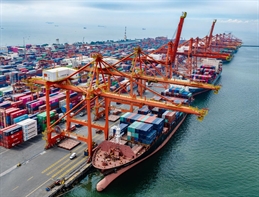
Ports in the Philippines are moving on with reforms, especially in the fields of automation digitization, attendees of a recent Transport Events webinar heard.
The leader in automation digitization is International Container Terminal Services Inc. (ICTSI), which runs five terminals in the Philippines and 32 worldwide.
The key to its fight against the virus was reducing person-to-person contacts and instead getting as much as possible done online and remotely. In this it has been astoundingly successful, Justin C. Tolentino, ICTSI’s director for commercial and risk management told the webinar.
As of October, ICTSI had 100% of its 30,000 monthly transactions online as compared to only 9% at the beginning of the year, he said. At that time, the remaining 91% of transactions were done physically on site.
The importance of online banking has grown for ICTSI, as well, as the moved to ADRs (advance deposit receipts) and will match deposits with the transactions customers needed online, Tolentino explained. ICTSI also helped itself by reducing the hours its physical billing office was open – another incentive to go online.
(Among the other initiatives undertaken to keep people out of a building they had previously needed to come into: allowing customers to print off gate passes remotely when payment was made.)
Official receipts also went online. “That was a big thing. Luckily, we were able to get that as well as E-WTS, (withholding tax forms),” added Tolentino, who said that of course e-invoicing is also now the norm.
Tolentino, though, is clear on two things: digitization was a lot of work and “it did require quite a bit of change management.” Much of the achievement lay in the details, such as sending out advisories once the crisis struck and providing lots of FAQs and videos to guide and educate users about the new process, he said.
What also helped was that Philippines government agencies, especially transportation agencies, increasingly mandated e-commerce in response to the pandemic.
It is perhaps a measure of how severe the pandemic is that a country as friendly as the Philippines, where business is usually done in person and with a smile, is now leading the way in doing things based around not seeing people. But as Tolentino said, “We just know this is the right, this is the right move.”
The move has been matched by new technology in the port such as, for safety, dashcams with GPS and speed sensors on Prime Movers and RTGs, as well as Cisco Jabber communications on workers’ tablets, connecting to the TradeLens platform and introduction of surveillance and facial recognition tech.
In order to minimize the amount of time drivers spend in the facility was an SMS alert system notifying them when X-ray holds are lifted. A further improvement ICTSI is currently “trying to pilot,” Tolentino said, is cameras in designated examination areas (DEAs) to allow inspections of containers by Customs officers to be done remotely.
ICTSI is not alone in this newly underlined belief in technology and automation as the way forward, although elsewhere, the pace of reform is slower.
Subic Bay Port in northern Luzon is currently upgrading its vessel traffic management system and, according to Marcelino S. Sanqui, senior deputy administrator for the Subic Bay Metropolitan Authority, will also roll out “additional modules in transhipment and bring in permit applications leading towards less physical transactions.”
Where there is less progress still is the vexing issue of infrastructure. Here, Subic is in a tighter position than ICTSI as it is reliant on the Subic-Clark cargo railway getting built.
This is still some way off as the latest news, yet to be officially confirmed, is that the Bases Conversion and Development Authority (BCDA) is rebidding the P1.5 billion (US$31.2 million) consulting services package of the Subic-Clark Railway Project.
The cargo rail project is expected to eventually connect the Subic Bay Freeport Zone and the Clark Freeport Zone with a 64-kilometre main line, with a 6.94-kilometer link to the Subic Bay Port’s New Container Terminal.
BCDA said in early November newspaper announcements that it “intends to apply the sum of P1,520,534,400.00, (US$31.58 million) inclusive of value-added tax and applicable government taxes, being the approved budget for the contract (ABC) to payments under the contract for the Consulting Services for the Subic-Clark Railway Project.”
The project has already been approved by the government, but both funding and a timeline have to be finalized and a consultant found. It remains to be seen if the fondness for new technology in the ports will speed up a broader adaption elsewhere as well as catalyze the demand for new facilities.
By Michael Mackey
Southeast Asia Correspondent | Bangkok



